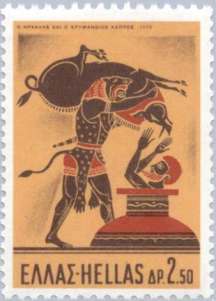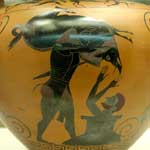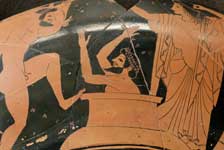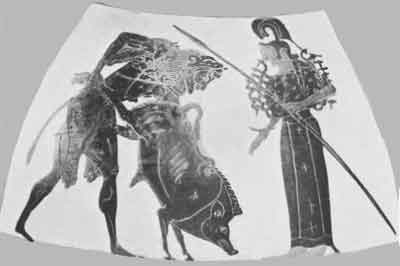.


Heracles and the Erymanthian boar, BM B213
In Greek mythology, the Erymanthian Boar (Ερυμάνθιος Κάπρος) is remembered in connection with The Twelve Labours, in which Heracles, the (reconciled) enemy of Hera, visited in turn "all the other sites of the Goddess throughout the world, to conquer every conceivable 'monster' of nature and rededicate the primordial world to its new master, his Olympian father," Zeus (Ruck and Staples, p.163).

In the primitive highlands of Arcadia, where old practices lingered, the Erymanthian Boar was a vicious creature that lived on Mount Erymanthos, a mountain that was apparently once sacred to the Mistress of the Animals, for in classical times it remained the haunt of Artemis (Homer, Odyssey, VI.105). A boar was a dangerous animal: "When the goddess turned a wrathful countenance upon a country, as in the story of Meleagros, she would send a raging boar, which laid waste the farmers' fields." (Kerenyi 1959, p 149) One was sent by Apollo to kill the youth Adonis, a favorite of Aphrodite, for revenge on her, as she had blinded Apollo's mortal son, Erymanthus because he had stumbled upon her bathing. Robert Graves (Graves 1955,126.1) suggested that Aphrodite had been substituted for Artemis in this retelling of the mytheme of the eponymous Erymanthus.
Heracles' fourth labour—by some counts, for there is no single definitive telling—was to capture the Boar. On the way there, Heracles visited Pholus ("caveman"), a kind and hospitable centaur and old friend. Heracles ate with him in his cavern—though the centaur devoured his meat raw—and asked for wine. Pholus had only one jar of wine, a gift from Dionysus to all the centaurs on Mt Erymanthus. Heracles convinced him to open it, and the smell attracted the other centaurs, who did not understand that wine needs to be tempered with water, became drunk and attacked. Heracles shot at them with his poisonous arrows, and the centaurs retreated all the way to Chiron's cave.
Pholus was curious why the arrows caused so much death, and picked one up but dropped it, and the arrow stabbed his feet, poisoning him. A stray arrow hit Chiron as well, but Chiron was immortal, although he still felt the pain. Chiron's pain was so great, he volunteered to give up his immortality, and take the place of Prometheus, who had been chained in Tartarus (part of the underworld), although he was an immortal Titan. Prometheus' torturer, the eagle, continued its torture on Chiron, so Herakles shot it dead with an arrow. It is generally accepted that the tale was meant to show Herakles as being the recipient of Chiron's surrendered immortality. The tale of the Centaurs sometimes appears in other parts of the twelve labours, as does the freeing of Prometheus.
Heracles had visited Chiron to gain advice on how to catch the boar, and Chiron had told him to drive it into thick snow, which sets this Labour in mid-winter. Having successfully caught the Boar, Heracles bound it and carried it back to Eurystheus (illustration upper right), who was frightened of it and ducked down in his subterranean wine jar, begging Heracles to get rid of the beast, a favorite subject for the vase-painters. Heracles obliged.


Heracles and the Erymanthian Boar, right side Athena

Hercules and Eurystheus, Louis Tuaillon
Hercules Fighting the Erymanthian Boar, Francisco de Zurbaran
Sources
- Ovid, Heroides ix
- Apollodorus, ii.5.4ff
- Diodorus Siculus iv.12
- Apollonius of Rhodes i.122ff
- Pausanias, Greece
References
- The Greek Myths: The Complete And Definitive Edition, Robert Graves
- The Heroes of the Greeks, Carl Kerenyi
- Carl A. P. Ruck and Danny Staples, The World of Classical Myth, 1994.
See also : Greek Mythology. Paintings, Drawings
| Ancient Greece
Science, Technology , Medicine , Warfare, , Biographies , Life , Cities/Places/Maps , Arts , Literature , Philosophy ,Olympics, Mythology , History , Images Medieval Greece / Byzantine Empire Science, Technology, Arts, , Warfare , Literature, Biographies, Icons, History Modern Greece Cities, Islands, Regions, Fauna/Flora ,Biographies , History , Warfare, Science/Technology, Literature, Music , Arts , Film/Actors , Sport , Fashion --- |
Retrieved from "http://en.wikipedia.org"
All text is available under the terms of the GNU Free Documentation License


